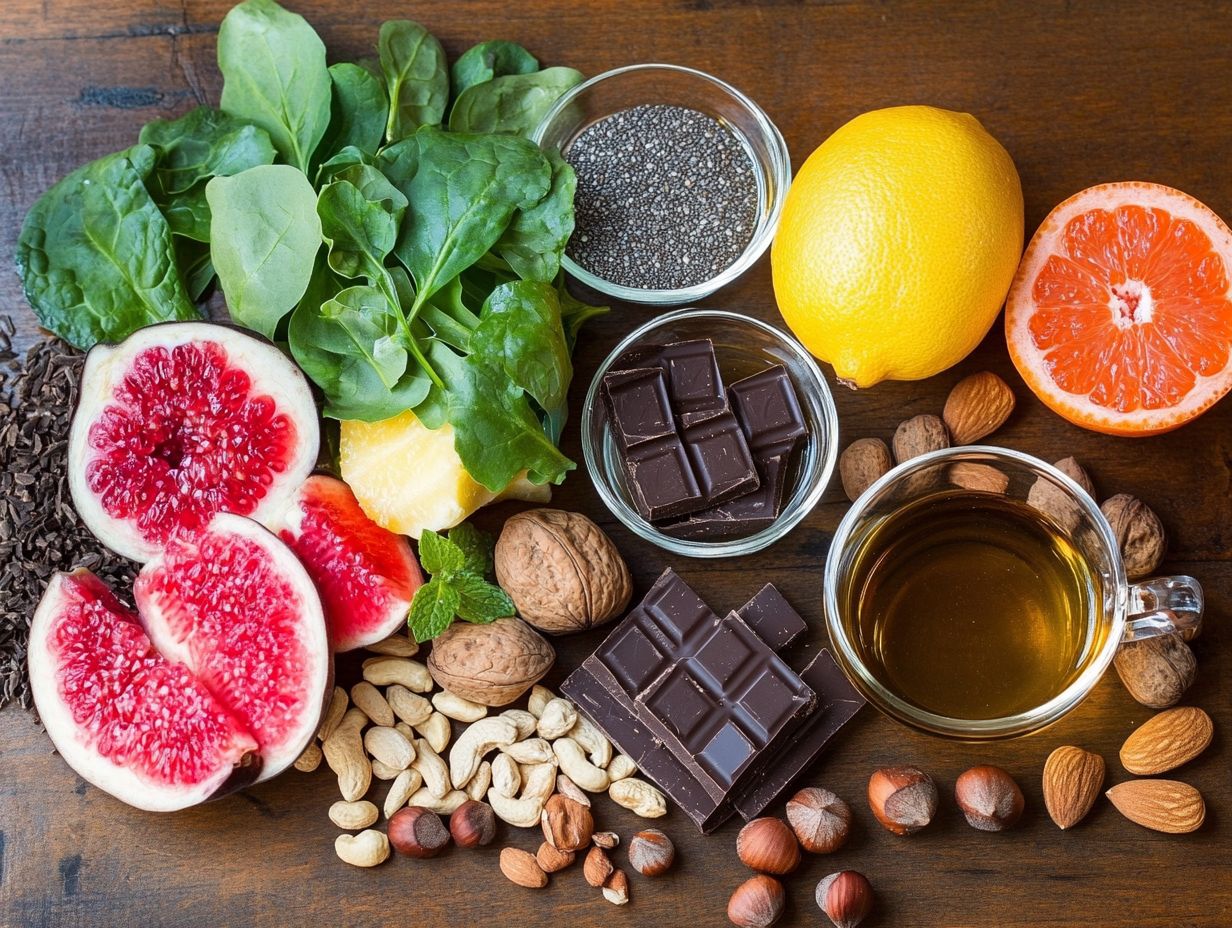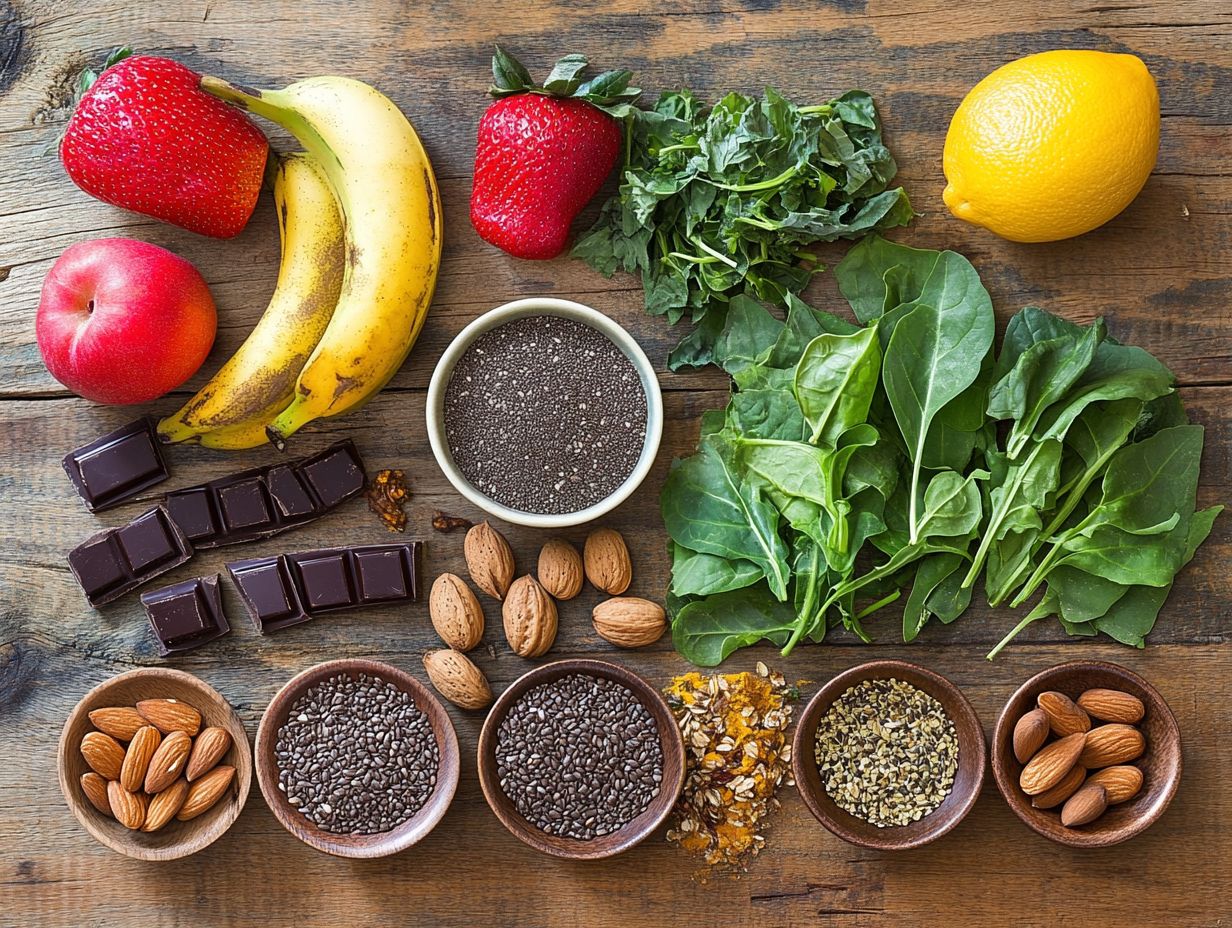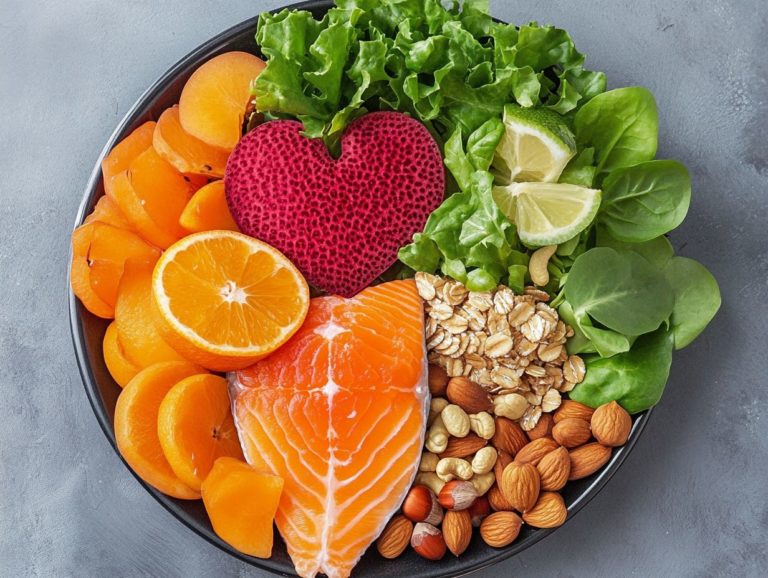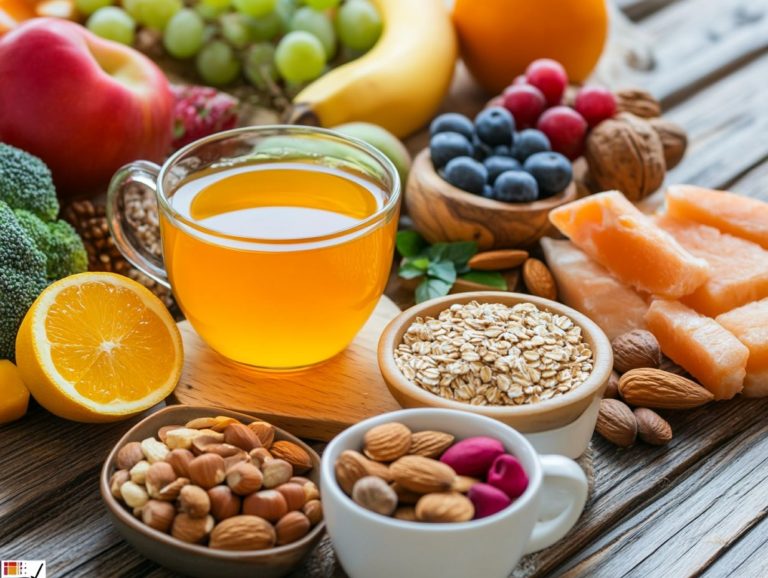Nutrition for Mental Health: Foods to Boost Mood
The intricate relationship between your gut and brain is becoming a focal point as research reveals how nutrition profoundly impacts mental health.
This article delves into the fascinating gut-brain connection and highlights essential nutrients that are crucial for regulating your mood. You ll discover which foods can elevate your spirits and uncover delectable recipes that nourish both your body and mind.
We will also explore the powerful role exercise plays in enhancing your mental well-being. Plus, we ll offer tips for maintaining a balanced lifestyle.
Join us on an exciting journey to boost your mental well-being through delicious nutrition!
Contents
- Key Takeaways:
- The Gut-Brain Connection
- Key Nutrients for Mood Regulation
- Best Foods for Boosting Mood
- Recipes for Mental Health
- The Role of Exercise in Mental Health
- Maintaining a Healthy Mind and Body
- Frequently Asked Questions
- What is the link between nutrition and mental health?
- Which foods are known to boost mood and mental health?
- How do fatty fish help with mental health?
- Can nuts and seeds really make a difference in mental health?
- How do whole grains contribute to mental health?
- What role do fermented foods play in mental health?
Key Takeaways:

- Nourish your gut to support a healthy mind. The connection between nutrition and mental health is crucial, and a balanced diet can help regulate mood.
- Incorporate key nutrients like vitamins, minerals, and omega-3 fatty acids into your diet to improve mood. Foods like fatty fish, leafy greens, and whole grains can have a positive impact on mental health.
- Exercise can improve both physical and mental health by releasing endorphins and reducing stress. Aim to incorporate regular physical activity into your routine and find enjoyable ways to stay active.
The Gut-Brain Connection
The gut-brain connection is a captivating and intricate relationship. It reveals how your nutrition directly affects your mental health.
This occurs through a myriad of complex chemical reactions. Recent research emphasizes the vital role of the gut microbiome in regulating your mood.
It also influences cognitive function and potentially eases psychological challenges. By grasping this connection, you can truly appreciate how dietary changes can be a formidable tool in enhancing your mental well-being.
This helps you address stress, anxiety, and depression. This highlights the significance of maintaining a clean diet filled with nutrient-rich foods.
Understanding the Link Between Nutrition and Mental Health
Understanding the connection between nutrition and mental health is essential for recognizing how dietary changes can significantly contribute to stress reduction.
These changes can enhance your overall emotional well-being. Numerous studies have delved into the profound link between what you eat and how you feel.
Some foods can uplift your mood, while others might amplify feelings of anxiety. For example, a well-balanced diet brimming with whole grains, lean proteins, and healthy fats equips you with the nutrients vital for optimal brain function, as highlighted in the nutrition for students: brain foods to boost focus.
Including an array of fruits and vegetables not only provides essential vitamins but also strengthens your body s resilience to stress.
The emotional ties between your food choices and your feelings underscore the notion that mindful eating can cultivate a sense of tranquility and stability.
This approach can potentially transform your perspective on mental wellness.
Key Nutrients for Mood Regulation
Key nutrients play a crucial role in regulating your mood. They directly influence serotonin levels, dopamine production, and your overall mental well-being.
Vitamins, Minerals, and Other Essential Nutrients
Vitamins, minerals, and other essential nutrients, including antioxidants, are vital for your mental health. They act as mood enhancers that optimize nutrient absorption.
Among these, B vitamins especially B6, B12, and folate are critical in synthesizing neurotransmitters. These are chemicals in your brain that help manage your mood.
Neurotransmitters like serotonin profoundly affect your mood and emotional stability. Omega-3 fatty acids, found in fish like salmon and sardines, are equally essential; they can help alleviate symptoms of anxiety and depression.
Then there’s magnesium, often hailed as the relaxant mineral. It supports nerve function and mitigates stress responses.
Incorporating leafy greens, nuts, and whole grains into your diet can provide these essential nutrients. Additionally, foods for stress relief, such as those rich in vitamin D like fortified dairy products and sunlight exposure, are linked to better mood regulation.
By ensuring a balanced intake of these vitamins and minerals, you not only enhance your mental clarity but also elevate your overall health.
Ready to dive deeper into the world of nutrition and mental health? Let s get started!
Best Foods for Boosting Mood

The finest foods for elevating your mood encompass a diverse array of whole foods, particularly those plant-based options rich in fiber and omega-3 sources.
These selections can profoundly enhance your mental well-being.
Incorporating Mood-Boosting Foods into Your Diet
Incorporating mood-boosting foods into your diet involves a thoughtful understanding of dietary patterns.
Make conscious choices that support clean eating and emotional well-being.
This means taking the time to explore the nutritional benefits of various food groups.
You can elevate your meals by adding a vibrant array of fruits and vegetables, packed with antioxidants and essential vitamins.
Including healthy fats from sources like avocados and nuts can significantly lift your mood.
Mindful eating is key; being present during meals allows you to fully savor the flavors and textures.
This fosters a positive relationship with food.
Planning your meals in advance ensures that mood-boosting ingredients are always at hand.
This makes it easier to create a balanced diet that aligns with your personal preferences.
Recipes for Mental Health
Crafting recipes for mental health that feature nutritious meal ideas rich in whole foods, high-fiber ingredients, and omega-3 sources can elevate your mood, especially when incorporating the impact of superfoods on mental health.
Embracing these wholesome choices can make a remarkable difference in how you feel.
Delicious and Nutritious Meal Ideas
Delicious and nutritious meal ideas have the power to transform your food habits.
They enhance your emotional nourishment and support mental health through a balanced diet.
Incorporating meals rich in omega-3 fatty acids, like grilled salmon paired with quinoa and leafy greens, can significantly elevate your mood.
A vibrant bowl of mixed berries and yogurt not only tantalizes your taste buds but also delivers antioxidants that help combat stress.
Consider adding a hearty lentil soup to your repertoire; it s packed with fiber and protein.
This promotes a sense of fullness and stability.
Try these simple yet effective recipes! They can help you build healthier habits and boost your emotional well-being.
By thoughtfully selecting your meals, you can cultivate a nurturing relationship with food.
These benefits extend far beyond the plate.
The Role of Exercise in Mental Health
The role of exercise in mental health is profoundly significant.
Engaging in physical activity enhances your mood and serves as a powerful tool for stress reduction.
It fosters a sense of community.
How Physical Activity Can Improve Mood

Physical activity has the remarkable ability to elevate your mood by releasing endorphins.
These delightful natural chemicals enhance your sense of happiness and overall mental well-being.
Endorphins function as your body’s own painkillers and mood enhancers.
They effectively ease feelings of stress and anxiety.
When you engage in regular exercise be it running, swimming, or even a brisk walk you cultivate a sense of accomplishment.
This boosts your self-esteem, creating a wonderfully positive feedback loop.
Participating in group workouts or team sports can significantly lift your spirits.
This fosters a sense of community.
Over time, the cumulative effects of these activities can lead to substantial long-term mental health benefits.
These include diminished symptoms of depression and greater resilience against life’s stressors.
Maintaining a Healthy Mind and Body
Maintaining a healthy mind and body is crucial for your overall well-being.
It requires a balanced lifestyle that embraces healthy eating for better mental health.
By nurturing both your mental and physical health, you set the foundation for a vibrant, fulfilling life.
Tips for Creating a Balanced Lifestyle for Mental Health
Creating a balanced lifestyle for your mental health involves establishing healthy food habits, engaging in regular exercise, and seeking support from a mental health professional when necessary.
To foster your well-being, prioritize nutrition. Incorporate a variety of fruits, vegetables, and whole grains into your daily meals. This can positively impact your mood and energy levels.
Integrating physical activities, whether through structured workouts or simple daily walks, will boost your physical fitness and enhance your emotional resilience.
Practices like mindfulness meditation or yoga can significantly improve your mental clarity and help reduce stress. Regular check-ins with a mental health professional are crucial for navigating emotional challenges, ensuring that you maintain a holistic approach to living a balanced and fulfilling life.
Watch our video to learn more about maintaining mental health through nutrition!
Frequently Asked Questions
What is the link between nutrition and mental health?
Nutrition plays a crucial role in mental health as certain foods can impact brain chemistry and mood. Understanding the connection between nutrition and mental health is essential, as eating a balanced and nutrient-rich diet can help improve mental health and well-being.
Which foods are known to boost mood and mental health?

Some of the best foods to boost mood and mental health include fatty fish, nuts and seeds, whole grains, fruits, vegetables, and fermented foods like yogurt and kefir.
How do fatty fish help with mental health?
Fatty fish like salmon, tuna, and sardines are rich in omega-3 fatty acids, linked to improved mood and reduced symptoms of depression and anxiety. They also contain vitamin D, essential for maintaining good mental health.
Can nuts and seeds really make a difference in mental health?
Yes, nuts and seeds are packed with important nutrients like magnesium, zinc, and B vitamins, known to support brain health and reduce symptoms of anxiety and depression. They provide healthy fats that help improve mood and energy levels.
How do whole grains contribute to mental health?
Whole grains, such as brown rice, quinoa, and oats, are great sources of complex carbohydrates that provide sustained energy and help regulate mood. They contain important vitamins and minerals that support brain function and mental health.
What role do fermented foods play in mental health?
Fermented foods like yogurt, kefir, and kimchi contain beneficial bacteria that support a healthy gut microbiome. This can greatly boost your mental health and overall happiness, as the gut and brain are closely connected through the gut-brain axis.
Start making small dietary changes today to experience improvements in your mood and energy!






